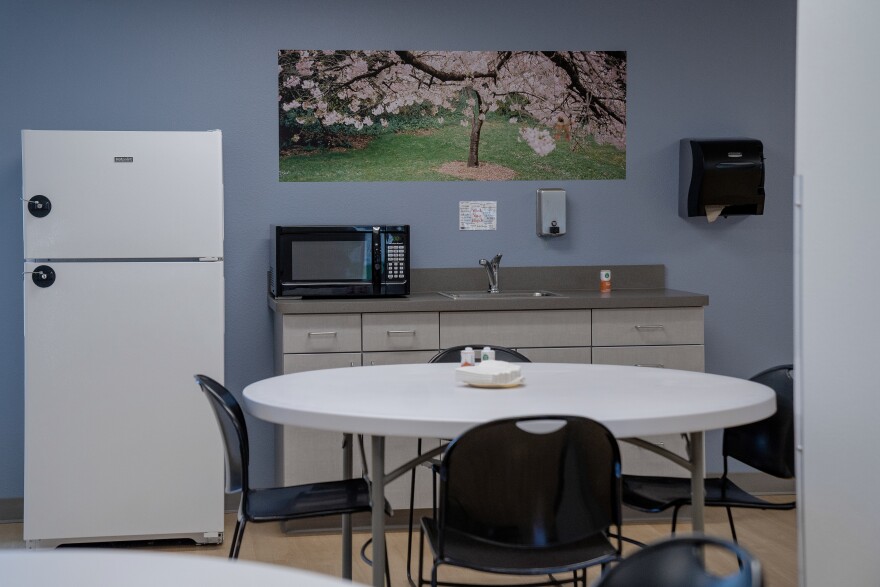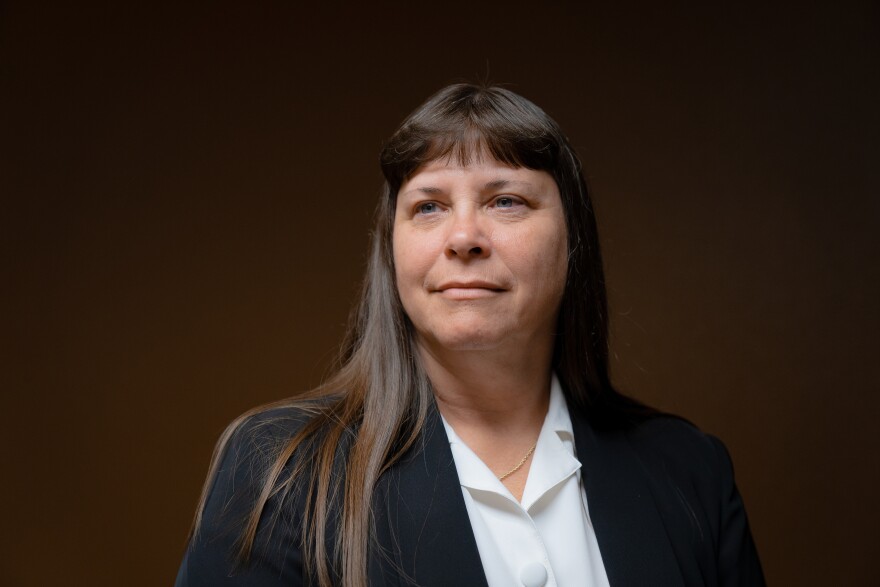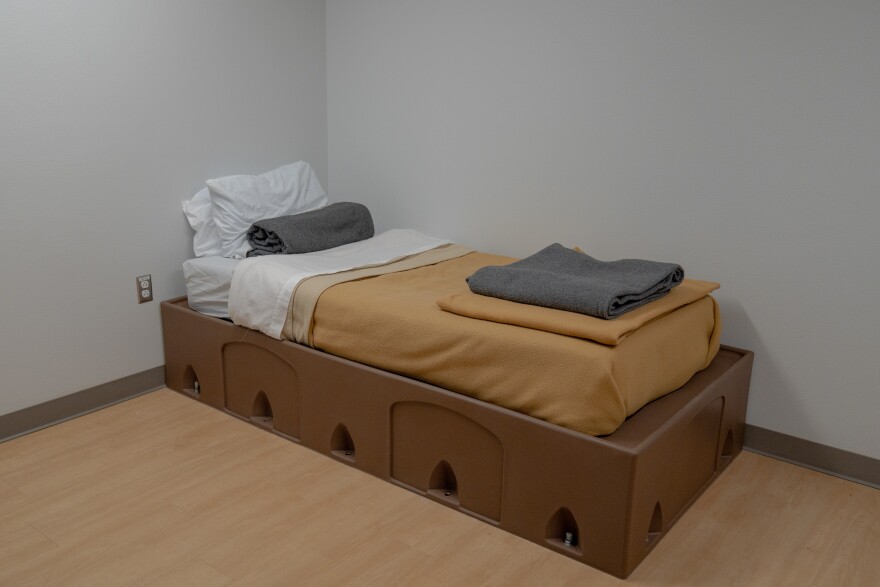Dr. Julie Rickard thought her visit to Wisconsin over the Christmas holiday would bring a break from her day job working in suicide prevention in Wenatchee, Wash.
The visit didn't go as planned. After a tense fight broke out between her mother and another family member, everyone dispersed. Rickard readied herself for the trip back to the Pacific Northwest.
At the airport, she received a call from her mother, Sheri Adler. This was not out of the ordinary — Adler, like many adoring mothers, always calls her daughter after parting ways.
On the phone, Adler wanted to tell her daughter how much she loved and appreciated her.
"Normally I would think, 'Oh that's a sign of suicide,' but it was during my layover," Rickard says. "I had just left her, and my whole life she had always cried when I left and would always say I love you."
This time was different. "This time," Rickard says, "it was goodbye."
When the plane landed, Rickard received another call. Her mother, at age 72, had tried to take her own life.
"I went home, and I guess I just didn't know how to handle it," Adler says about the suicide attempt. "It was just more than I could put together ... I just made a stupid mistake. I guess I just wanted to give up, because I felt like I wasn't a good mom. And that's all I ever wanted to be."

Since the attempt in January, Rickard has helped her mother find care. Adler now takes medication and meets with a therapist for depression and help coping with family issues. They both say she's doing better.
Still, the episode reflects the vulnerability of a group that researchers call a "forgotten" population, particularly when it comes to the issue of mental health: senior citizens.
The Risk Among Seniors

Across the country, suicide rates have been on the rise, and that rise has struck the nation's seniors particularly hard. Of the more than 47,000 suicides that took place in 2017, those 65 and up accounted for more than 8,500 of them, according to the Centers for Disease Control and Prevention. Men who are 65 and older face the highest risk of suicide, while adults 85 and older, regardless of gender, are the second most likely age group to die from suicide.
According to the U.S. Census Bureau, there were 47.8 million people over the age of 65 in the U.S. as of 2015. By 2060, that number is projected to reach 98.2 million.
Don't see the graphic above? Click here.
That concerns mental health experts like Dr. Jerry Reed, who manages suicide, violence and injury prevention at the nonprofit Education Development Center.
"It's likely that if we have a problem now, we may very well have a problem in the future if we don't pay attention," says Reed.
What's particularly worrying, say experts like Reed, is that when seniors attempt suicide, they are far more likely to die than those who are younger.

Research has found that one out of four senior citizens that attempt suicide dies, compared to one out of 200 attempts for young adults. While the precise reasons for these figures remain unclear, experts suggest seniors are frailer and thus more vulnerable to self-inflicted injury. They can also be more isolated, which makes rescues more difficult, and perhaps even plan their attempts more carefully.
Why Seniors Are At Risk
There are myriad reasons that elderly adults are more susceptible to the nation's 10th leading cause of death.
One of the most prevalent is loneliness. Older adults often live in isolation and may be struggling with the death of a lifelong husband or wife, or with the grief of losing other close family or friends .
Research has shown that bereavement is "disproportionately experienced by older adults" and can often trigger physical or mental health illnesses like "major depression and complicated grief." With children often far from home, parents and grandparents can be left miles away, craving the love and human connection family visitation brings.
Aging can also present transitions that are difficult to cope with. Approximately 80% of older adults live with a chronic disease – such as arthritis, diabetes and high blood pressure — and 77% have at least two, according to The National Council on Aging.
As senior citizens lose the ability to complete once routine daily tasks, depression can set in. Physical ailments might end a senior's ability to drive, read, engage in conversation or other activities that allow a person to stay independent or find meaning.
"Transitions are a very difficult period for someone in life, and if you're not prepared for that transition, you tend to notice every single behavior that marginalizes or sets you aside from other people," Reed says.
For Adler, it was a combination of factors that led her to want to end her life. She lives more than 1,500 miles from her daughter, whom she describes as her best friend, and that distance, she says, and the isolation that came with it, proved difficult.
"It helps to be around other people ... when [my daughter is] so far away, it just seems hopeless," Adler says. "And I did something stupid ... I just couldn't take it anymore."
Rickard, a psychologist, feels that when her mother lost the ability to read books in the aftermath of a stroke, her mental health was negatively affected and she lost a part of her identity.

Adler also says that as an older person, she sometimes feels stigmatized — she says people avoid talking to her and don't want to engage. Growing older in America can be "very hard," she says. "People don't talk to you."
Knowing What To Watch For
Research on suicide among the elderly is scant, which means loved ones and caretakers are often unaware of the warning signs. But experts say there are certain behaviors that should be considered red flags. These include stockpiling medication, rushing to revise a will, using alcohol or drugs increasingly, altering sleep habits, sharing statements of hopelessness and withdrawing socially.
The American Foundation for Suicide Prevention also warns of seniors saying goodbye or expressing the feeling of being a burden.

Following a rash of suicides in nearby senior citizens communities, Rickard in 2012 founded the Suicide Prevention Coalition of North Central Washington State. The coalition's work has helped drive down the number of suicides in the area.
Now, Rickard works as the program director at American Behavioral Health Systems, a provider of substance abuse treatment services. She is also spearheading one of the nation's only pilot projects to coach physicians and residents in long-term care on the warning signs of suicide.
Rickard believes that through human contact, medical and psychiatric help, exercise, physical well-being, regular visits to primary care providers and hydration, seniors can improve their mental health.

"Oftentimes there's a belief that it's a normal part of aging for people to feel bad, or to go through loss, or to have lots of death and grief, and to just not recover from their depression, when in truth it's very recoverable and it's something we should be targeting," Rickard says.
Unfortunately, Rickard says, seniors are often left behind in America.
"If we treated them they wouldn't feel like they were swimming in the middle of the ocean with no life preserver," Rickard says.
As for her own mother, she says she hopes she now realizes there is nothing she could ever do to be a "burden" to her. "It's a gift to me when she asks for help or I get to be there for or just spending time with her," Rickard says. "And what I hope millions of people hear in this message is that they're not a burden either."
If you or someone you know may be considering suicide, contact the National Suicide Prevention Lifeline at 1-800-273-8255(En Español: 1-888-628-9454; deaf and hard of hearing: 1-800-799-4889) or the Crisis Text Line by texting HOME to 741741.
Copyright 2020 NPR. To see more, visit https://www.npr.org.



